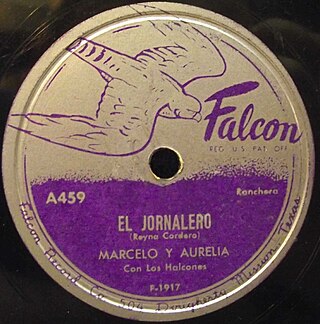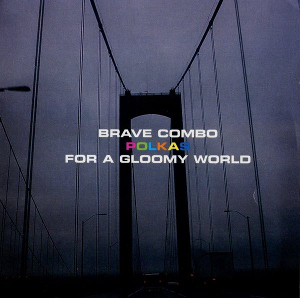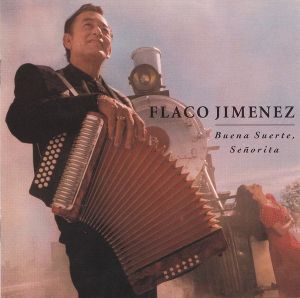
Tejano music, also known as Tex-Mex music, is a popular music style fusing Mexican and US influences. Typically, Tejano combines Mexican Spanish vocal styles with dance rhythms from Czech and German genres – particularly polka or waltz. Tejano music is traditionally played by small groups featuring accordion and guitar or bajo sexto. Its evolution began in northern Mexico.
The term conjunto refers to several types of small musical ensembles present in different Latin American musical traditions, mainly in Mexico and Cuba. While Mexican conjuntos play styles such as norteño and tejano, Cuban conjuntos specialize in the son, as well as its derivations such as salsa.

Norteño or Norteña, also música norteña, is a subgenre of regional Mexican music. The music is most often based on duple and triple metre and its lyrics often deal with socially relevant topics, although there are also many norteño love songs. The accordion and the bajo sexto are traditional norteño's most characteristic instruments. Norteña music developed in the late 19th century, as a mixture between local Mexican music and Austrian-Czech-origin folk music.

Leonardo "Flaco" Jiménez is an American singer, songwriter and accordionist from San Antonio, Texas. He is known for playing Norteño, Tex Mex and Tejano music. Jiménez has been a solo performer and session musician, as well as a member of the Texas Tornados and Los Super Seven.

Santiago Jiménez Jr. is an American folk musician who received a National Heritage Fellowship in 2000 for lifetime achievement in traditional Tex-Mex/folk music, and a National Medal of Arts in 2016. He has been nominated for three Grammys.
Esteban "Steve" Jordan was a jazz, rock, blues, conjunto and Tejano musician from the United States. He was also known as "El Parche", "The Jimi Hendrix of the accordion", and "the accordion wizard". An accomplished musician, he played 35 different instruments.

Narciso Martínez, was a Mexican folk musician. His nickname was El Huracan del Valle. He began recording in 1935 and is the father of conjunto music. The Spanish word conjunto means 'group' and in El Valle de Tejas that means accordion, bajo sexto, and contrabajo. The same year, he and Santiago Almeida recorded their first 78 rpm record containing the polka "La Chicharronera" and the schottishche "El Tronconal" for Bluebird Records, which quickly became a success.
Paulino Bernal was an American accordion player and Christian evangelist. He was a member of the Tejano Tex-Mex group Conjunto Bernal.
Gary Lee Hobbs is an American singer-songwriter, record producer, and actor. Called "Tejano music's Vince Gill", he has been widely recognized for his resonant baritone vocals, characterized by their emotive quality, and is considered a pioneer within the genre. Hobbs played a significant role in the expansion of Tejano music during the 1990s and became one of the most popular Tejano singers of the 1980s and 1990s.
Pedro Ayala, called "El Monarca del Acordeón", was a Mexican accordionist and songwriter from General Terán, Nuevo León, Mexico. Pedro Ayala was a pioneer of conjunto music with his distinctive accordion playing, receiving a National Heritage Fellowship from the National Endowment for the Arts for his contribution to conjunto and folk music.

Arturo Castillo, Jr., better known as AJ Castillo, is an American singer of Mexican descent. He is a cumbia, and Tejano music recording artist, accordionist, singer, performer, and producer. His debut album, "Who I Am", was released in 2009. His second album, On My Way, was released in 2010. Castillo won Best New Artist – Male at the 2010 Tejano Music Awards.
Los Alegres de Terán were a Mexican Norteño band. They were formed in Nuevo León when Eugenio Abrego and Tomas Ortiz met in a club in the mid-1940s focusing their activities around the area of Monterrey, Reynosa, and finally settling in McAllen, Texas.
Antonio de la Rosa was an influential tejano musician. He was noted for producing dynamic and harmonic accordion runs on the two-row button accordion.

Falcon Records was a record label from McAllen, Texas, that was instrumental in the establishment of tejano as a widespread musical style. Founded in 1948 by Arnaldo Ramirez, the label specialized in the rural norteño music which had been abandoned by the major labels. By the early 1960s it was clearly the leading tejano music label. Falcon was responsible for numerous recordings by Los Alegres de Terán, Chelo Silva, René y René, Roberto Pulido, and many other tejano and norteño artists of significance. Falcon's product gained international exposure through the syndicated television program Fanfarria Falcon. The label's activities wound down around 1990, and the recordings were purchased by EMI. The company's historical artifacts are held at the Jernigan Library at Texas A&M University–Kingsville.

Ideal Records was a record label from Texas specializing in Tejano music. It became the most important record label of the genre in the 1940s and 1950s, recording tejano's most prominent artists. It declined in the early 1960s, but not before leaving an indelible mark on Tex-Mex culture.
Carmen y Laura were a Mexican-American sister musical act who were considered a Tejano version of the Andrews Sisters. They were the first artists to record for Ideal Records.
Eva Ybarra known as the "Queen of the Accordion", is a professional conjunto musician.

Polkas for a Gloomy World is an album by the American band Brave Combo, released in 1995. The band intended for it to be a return to their traditional polka fusion roots.

Buena Suerte, Señorita is an album by the American musician Flaco Jiménez, released in 1996. It was released around the same time as the Texas Tornados' 4 Aces. The first single was "Borracho #1".
Linda Escobar is an American singer-songwriter. Referred to as the "Queen of Conjunto music", she has been called one of the most influential women of South Texas and one of the most important figures of conjunto music. Escobar rose to fame as a child in 1965 when her song "Frijolitos Pintos" sold a million copies. She embarked on touring alongside her father, Eligio Escobar, spanning the United States, Mexico, and Central America. In 1998, she started the El Veterano Conjunto Festival in San Antonio, Texas, honoring U.S. war veterans on Veterans Day. The festival culminates with the awarding of music scholarships. In 2017, U.S. Representative Filemon Vela Jr. acknowledged Escobar for her contributions to Tejano and conjunto music during Women's History Month. In 2019, she was inducted into the South Texas Music Walk of Fame and received the Lifetime Achievement Award at the Tejano Music Awards. With a music catalog of circa 500 songs, Escobar is widely recognized for boasting one of the longest and most prolific music careers in the Tejano market.










